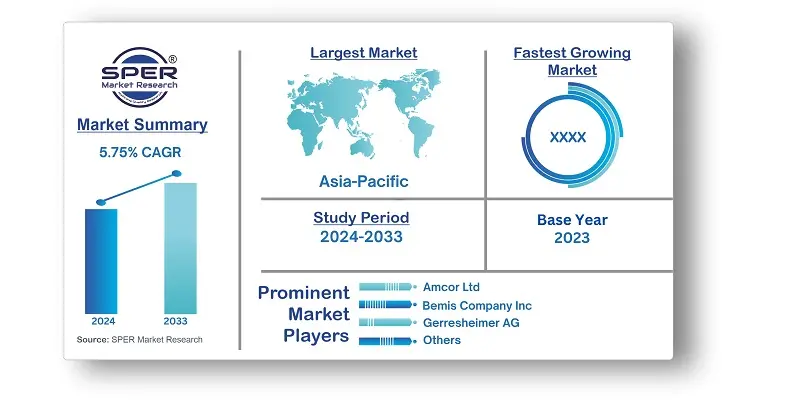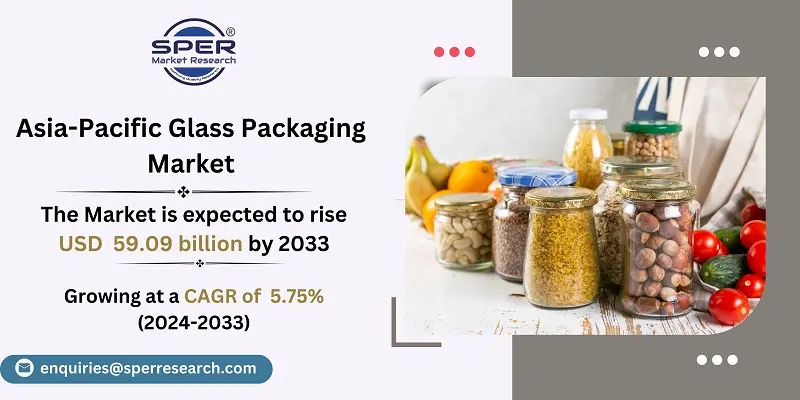
Asia Pacific Glass Packaging Market Growth, Size, Trends, Share, Revenue and Future Outlook
Asia-Pacific Glass Packaging Market Size- By Product Type, By End User- Regional Outlook, Competitive Strategies and Segment Forecast to 2033
| Published: Mar-2024 | Report ID: PACK2403 | Pages: 1 - 158 | Formats*: |
| Category : Packaging | |||
- November 2022: Epice was declared the winner of the Trendtag Glas award by Weigand-Glass GmBH for its tasteful and elegant packaging of the fragile glass bottle, which highlighted the high caliber of the contents and securely shielded the dried flowers that are sensitive to scent.
- In May 2022: Gerresheimer announced the opening of new facilities in India to meet the demands of its pharmaceutical customers worldwide. The new facilities include state-of-the-art, environmentally friendly furnace technology for glass production.


| Report Metric | Details |
| Market size available for years | 2020-2033 |
| Base year considered | 2023 |
| Forecast period | 2024-2033 |
| Segments covered | By Product Type, By End User |
| Regions covered | China, Japan, India, Rest of Asia-Pacific |
| Companies Covered | Amcor Ltd, Bemis Company Inc., Gerresheimer AG, Hindustan National Glass & Industries Ltd, MTS Medication Technologies (Omnicell Inc.), Piramal Glass Company, RPC Group, Saver Glass, Sonoco Products Company, Tetra Laval, and Others. |
- Manufacturers and Suppliers
- Packaging Industry Professionals
- Distributors and Wholesalers
- Retailers and E-commerce Platforms
- Investors and Financial Institutions
- Government Agencies and Regulatory Bodies
- Research Institutions and Academics
- Environmental Organizations
| By Product Type: |
|
| By End User: |
|
| By Region: |
|
- Asia-Pacific Glass Packaging Market Size (FY’2024-FY’2033)
- Overview of Asia-Pacific Glass Packaging Market
- Segmentation of Asia-Pacific Glass Packaging Market By Product Type (Bottles and Jars)
- Segmentation of Asia-Pacific Glass Packaging Market By End User (Food, Beverage, Personal Care, Healthcare, Household Care, Pharmaceutical, Others)
- Expansion Analysis of Asia-Pacific Glass Packaging Market
- Problems and Obstacles in Asia-Pacific Glass Packaging Market
- Competitive Landscape in the Asia-Pacific Glass Packaging Market
- Impact of COVID-19 and Demonetization on Asia-Pacific Glass Packaging Market
- Details on Current Investment in Asia-Pacific Glass Packaging Market
- Competitive Analysis of Asia-Pacific Glass Packaging Market
- Prominent Players in the Asia-Pacific Glass Packaging Market
- SWOT Analysis of Asia-Pacific Glass Packaging Market
- Asia-Pacific Glass Packaging Market Future Outlook and Projections (FY’2024-FY’2033)
- Recommendations from Analyst
1.1. Scope of the report1.2. Market segment analysis
2.1. Research data source2.1.1. Secondary Data2.1.2. Primary Data2.1.3. SPER’s internal database2.1.4. Premium insight from KOL’s2.2. Market size estimation2.2.1. Top-down and Bottom-up approach
2.3. Data triangulation
4.1. Driver, Restraint, Opportunity and Challenges analysis4.1.1. Drivers4.1.2. Restraints4.1.3. Opportunities4.1.4. Challenges4.2. COVID-19 Impacts of the Asia-Pacific Glass Packaging Market
5.1. SWOT Analysis5.1.1. Strengths5.1.2. Weaknesses5.1.3. Opportunities5.1.4. Threats5.2. PESTEL Analysis5.2.1. Political Landscape5.2.2. Economic Landscape5.2.3. Social Landscape5.2.4. Technological Landscape5.2.5. Environmental Landscape5.2.6. Legal Landscape5.3. PORTER’s Five Forces5.3.1. Bargaining power of suppliers5.3.2. Bargaining power of buyers5.3.3. Threat of Substitute5.3.4. Threat of new entrant5.3.5. Competitive rivalry5.4. Heat Map Analysis
6.1. Asia-Pacific Glass Packaging Market Manufacturing Base Distribution, Sales Area, Product Type6.2. Mergers & Acquisitions, Partnerships, Product Launch, and Collaboration in Asia-Pacific Glass Packaging Market
7.1. Asia-Pacific Glass Packaging Market Value Share and Forecast, By Product Type, 2024-20337.2. Bottles and Jars7.3. Caps and Closures7.4. Trays and Containers7.5. Vials7.6. Labels7.7. Others
8.1. Asia-Pacific Glass Packaging Market Value Share and Forecast, By End User, 2024-20338.2. Food8.3. Beverage8.4. Personal Care8.5. Healthcare8.6. Household Care8.7. Pharmaceutical8.8. Others
9.1. Asia-Pacific Glass Packaging Market Size and Market Share
10.1. Asia-Pacific Glass Packaging Market Size and Market Share By Product Type (2020-2026)10.2. Asia-Pacific Glass Packaging Market Size and Market Share By Product Type (2027-2033)
11.1. Asia-Pacific Glass Packaging Market Size and Market Share By Shipment Weight (2020-2026)11.2. Asia-Pacific Glass Packaging Market Size and Market Share By Shipment Weight (2027-2033)
12.1. Asia-Pacific Glass Packaging Market Size and Market Share By End user (2020-2026)12.2. Asia-Pacific Glass Packaging Market Size and Market Share By End user (2027-2033)
13.1. Asia-Pacific Glass Packaging Market Size and Market Share By Region (2020-2026)13.2. Asia-Pacific Glass Packaging Market Size and Market Share By Region (2027-2033)13.3. China13.4. Japan13.5. India13.6. Rest of Asia-Pacific
14.1. Amcor Ltd14.1.1. Company details14.1.2. Financial outlook14.1.3. Product summary14.1.4. Recent developments14.2. Bemis Company Inc.14.2.1. Company details14.2.2. Financial outlook14.2.3. Product summary14.2.4. Recent developments14.3. Gerresheimer AG14.3.1. Company details14.3.2. Financial outlook14.3.3. Product summary14.3.4. Recent developments14.4. Hindustan National Glass & Industries Ltd14.4.1. Company details14.4.2. Financial outlook14.4.3. Product summary14.4.4. Recent developments14.5. MTS Medication Technologies (Omnicell Inc.)14.5.1. Company details14.5.2. Financial outlook14.5.3. Product summary14.5.4. Recent developments14.6. Piramal Glass Company14.6.1. Company details14.6.2. Financial outlook14.6.3. Product summary14.6.4. Recent developments14.7. RPC Group14.7.1. Company details14.7.2. Financial outlook14.7.3. Product summary14.7.4. Recent developments14.8. Saver Glass14.8.1. Company details14.8.2. Financial outlook14.8.3. Product summary14.8.4. Recent developments14.9. Sonoco Products Company14.9.1. Company details14.9.2. Financial outlook14.9.3. Product summary14.9.4. Recent developments14.10. Tetra Laval14.10.1. Company details14.10.2. Financial outlook14.10.3. Product summary14.10.4. Recent developments14.11. Others
SPER Market Research’s methodology uses great emphasis on primary research to ensure that the market intelligence insights are up to date, reliable and accurate. Primary interviews are done with players involved in each phase of a supply chain to analyze the market forecasting. The secondary research method is used to help you fully understand how the future markets and the spending patterns look likes.
The report is based on in-depth qualitative and quantitative analysis of the Product Market. The quantitative analysis involves the application of various projection and sampling techniques. The qualitative analysis involves primary interviews, surveys, and vendor briefings. The data gathered as a result of these processes are validated through experts opinion. Our research methodology entails an ideal mixture of primary and secondary initiatives.



Frequently Asked Questions About This Report
PLACE AN ORDER
Year End Discount
Sample Report
Pre-Purchase Inquiry
NEED CUSTOMIZATION?
Request CustomizationCALL OR EMAIL US
100% Secure Payment






Related Reports
Our Global Clients
Our data-driven insights have influenced the strategy of 200+ reputed companies across the globe.




















